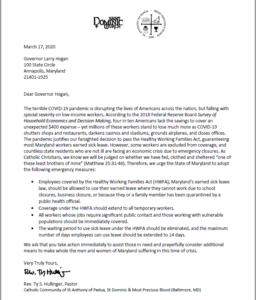Covid-19 and American Workers
The Covid-19 epidemic has impacted everyone in the United States in some way or another, but its impact on many categories of workers has been especially brutal. Some sectors, such as air transportation, hotels and restaurants, are virtually shut down, leaving workers without a paycheck. Meanwhile, workers employed in mass transit, grocery stores and especially hospitals and nursing homes are exposed to severe risk of infection, illness and death.
Let’s start with the unemployed. UNITE HERE, which represents more than 300,000 workers in hotels, restaurants and institutional cafeterias, reports that 98% of its members are out of work. The grand hotels of major cities and casinos of Las Vegas have gone dark, but those aren’t the only UNITE HERE members affected. Airline bookings have fallen through the floor. That’s led to furloughs and layoffs for flight attendants, pilots, ticket agents and ramp workers – and the kitchen workers who pack meals for airline flights. As readers of this blog well know, many of these workers also belong to UNITE HERE. Airline, hotel and restaurant workers surely have a long and difficult road ahead: with financial concerns and residual fears of infection, it will take years before Americans resume their pre-pandemic travel and entertainment spending levels.
While record unemployment affects much of the workforce, a few critical sectors are witnessing skyrocketing demand – and with it, skyrocketing risk of worker exposure to the coronavirus. Witness the challenges of supermarket cashiers and clerks: on April 13 the United Food and Commercial Workers (UFCW) reported that covid-19 infections had killed at least 30 supermarket workers. Amazon warehouse workers don’t have a union, so there’s no workers’ representative to share numbers, but infections there have resulted in worker protests and walkouts. And of course no one faces a greater risk of infection than the doctors, nurses and techs treating covid-19 victims in our nation’s hospitals. Nearly 10,000 health care workers have been infected by the virus, making them a shocking 10-20% of the coronavirus cases. (Fortunately, many of these workers are young and have no prior health conditions, so there are fewer hospitalizations and fatalities than that number might suggest.)
Bus drivers and subway operators face the worst of both worlds. Reduced service means fewer hours and fewer jobs, and many riders are expected to steer clear of crowded buses and trains for the foreseeable future. But our metro employees continue to carry those at-risk health care, supermarket, and distribution center workers to and from their jobs, and mass transit is not configured for social distancing. The result? At least 75 transit workers killed by covid-19 despite reduced service. It’s especially bad in New York City, home of both America’s largest mass transit system and the pandemic’s domestic epicenter.
Please pray for the unemployed and those whose jobs place them at elevated risk for infection. And urge OSHA to issue an emergency temporary standard to protect everyone from unnecessary risk on the job.

